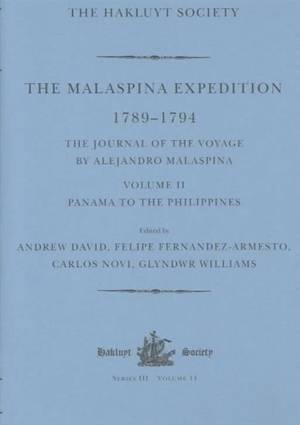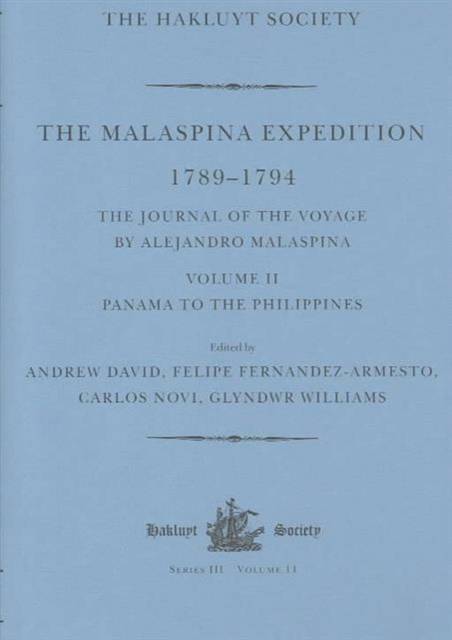
- Retrait gratuit dans votre magasin Club
- 7.000.000 titres dans notre catalogue
- Payer en toute sécurité
- Toujours un magasin près de chez vous
- Retrait gratuit dans votre magasin Club
- 7.000.000 titres dans notre catalogue
- Payer en toute sécurité
- Toujours un magasin près de chez vous
The Malaspina Expedition 1789-1794 / ... / Volume II / Panama to the Philippines
175,95 €
Description
Among the voyages of exploration and surveying in the late 18th century, that of Alejandro Malaspina best represents the high ideals and scientific interests of the Enlightenment. Italian-born, Malaspina entered the Spanish navy in 1774. In September 1788 he and fellow-officer José Bustamante submitted a plan to the Ministry of Marine for a voyage of survey and inspection to Spanish territories in the Americas and Philippines. The expedition was to produce hydrographic charts for the use of Spanish merchantmen and warships and to report on the political, economic and defensive state of Spain's overseas possessions. The plan was approved and in July 1789 Malaspina and Bustamante sailed from Càdiz in the purpose-built corvettes, Descubierta and Atrevida. On board the vessels were scientists and artists and an array of the latest surveying and astronomical instruments. The voyage lasted more than five years. On his return Malaspina was promoted Brigadier de la Real Armada, and began work on an account of the voyage in seven volumes to dwarf the narratives of his predecessors in the Pacific such as Cook and Bougainville. Among much else, it would contain sweeping recommendations for reform in the governance of Spain's overseas empire. But Malaspina became involved in political intrigue. In November 1795 he was arrested, stripped of his rank and sentenced to life imprisonment. Although released in 1803, Malaspina spent the last seven years of his life in obscure retirement in Italy. He never resumed work on the great edition, and his journal was not published in Spain until 1885. Only in recent years has a multi-volume edition appeared under the auspices of the Museo Naval, Madrid, that does justice to the achievements of what for long was a forgotten voyage. This second volume in a series of three contains Malaspina's diario or journal, for the first time in English translation and with commentary. It covers the period from 15 December 1790 to 15 November 1792, when he visited the Pacific coasts of Central and North America, as far north as Alaska, before crossing the ocean to the Philippines. Other texts include the apocryphal voyage of Ferrer Maldonaldo through the Strait of Anian, which led to a major diversion of the Malaspina expedition in 1791.
Spécifications
Parties prenantes
- Editeur:
Contenu
- Nombre de pages :
- 509
- Langue:
- Anglais
- Collection :
Caractéristiques
- EAN:
- 9780904180817
- Date de parution :
- 28-02-04
- Format:
- Livre relié
- Format numérique:
- Genaaid
- Dimensions :
- 175 mm x 246 mm
- Poids :
- 452 g






